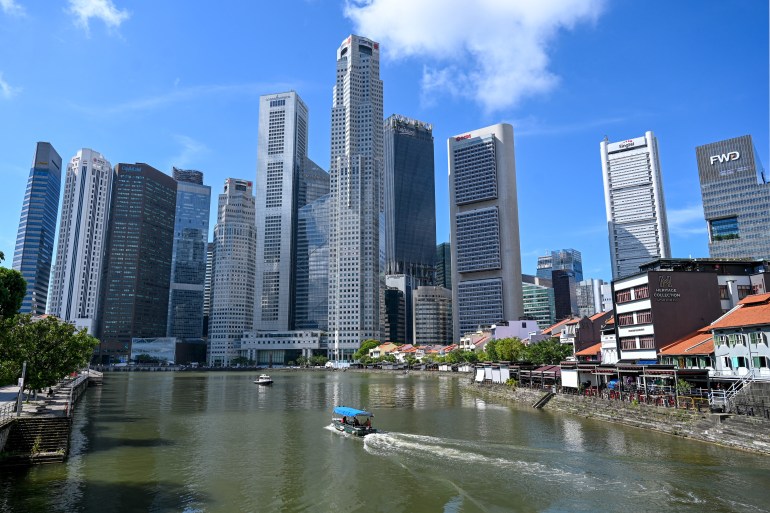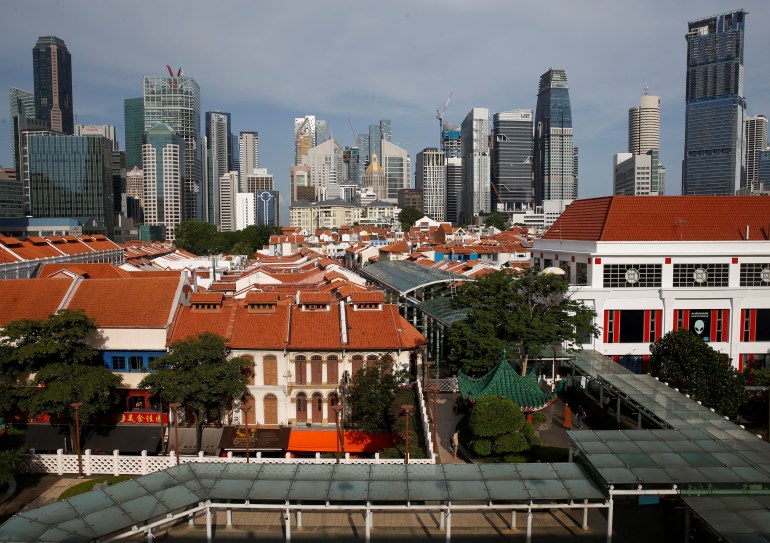Singapore – One of the world’s most open economies is attempting a delicate balancing act.
On the one hand, the Southeast Asian city-state wants to lure the world’s best and brightest to bolster its workforce, one of Asia’s most diverse.
On the other hand, it has to assure locals competing with foreigners for jobs that the system works for them, too, nipping potential resentment or xenophobia in the bud.
From next year, the government will tweak that calculus in favour of locals by raising the salary threshold for foreigners seeking approval to work in the city-state.
Last month, Singapore’s Ministry of Manpower announced that new applicants for the Employment Pass (EP) system will have to earn at least 5,600 Singapore dollars ($4,140) per month, up from 5,000 Singapore dollars ($3,700).
Applicants working in the financial services sector will have to earn at least 6,200 Singapore dollars ($4,600), compared with 5,500 Singapore dollars ($4,100) at present.
“By regularly updating the qualifying salaries based on the set wage benchmarks, we ensure a level-playing field for locals,” Manpower Minister Tan See Leng told parliament during a budget debate.
Analysts said the changes were not surprising for a government that has regularly tweaked the rules for expat workers, most recently in September 2022, when it raised the salary threshold by 500 Singapore dollars ($370).
Walter Theseira, an associate professor and labour economist at the Singapore University for Social Sciences (SUSS), said the move had been “telegraphed [for] a number of years”.
Theseira said that while the EP system was originally intended to import highly-skilled workers to fill gaps in the workforce, “the criteria seemed to have expanded and EP holders became more prevalent in the middle of the market as well”.
“This was perceived by local workers to be unwelcome competition for jobs that many skilled locals could do, so the government responded by re-calibrating the EP again upwards, so that based on salaries, it now targets more clearly the high-end,” he said.

For decades, Singapore, an island with no natural resources that is about the size of New York City, has built its reputation on an openness to foreign talent.
The number of EP holders has grown substantially over the years, fuelled in part by anxiety over the country’s rock-bottom birthrate and greying population.
As of December last year, there were about 205,400 EP holders in the city, up from 161,700 during the same month in 2021.
As far back as 2021, Tan acknowledged that Singaporeans, though recognising the need to attract foreign talent, had concerns that the influx came at the “expense” of local businesses.
A labour market report released by the Manpower Ministry last month showed that employment growth in 2023, comprising 88,400 positions in Singapore – excluding migrant domestic workers – was largely made up of foreigners.
The revision of the EP qualification criteria can be seen as “a strategic move” to appease age-old tensions over hiring foreign talent amid a crowded job market, said Joshua Yim, the CEO of Achieve Group, a talent acquisition consultancy.
The changes also come as the Southeast Asian country is gearing up for one of the most politically significant transitions in its history.
Singapore’s ruling People’s Action Party is set to fight the next general election, due by 2025, under new leadership as incumbent Prime Minister Lee Hsien Loong prepares to step down after some two decades in office.
The issue of foreign workers became salient in the 2011 general election, when public discontent simmered over rising competition for jobs and increasing pressure on public infrastructure.
While most Singaporeans and permanent residents agree that immigration is generally good for the economy, slightly more than half also believe that immigrants take jobs away from locals, according to a 2021 survey by the Institute of Policy Studies.
In another survey conducted by the research firm Milieu Insight, Singaporeans were almost evenly divided on whether the nation struck the right balance between bringing in foreign workers and protecting local jobs.
Sid Suhas, the senior vice president and head of EMEA & APAC at the talent acquisition firm Cielo, said the visa changes are likely to prompt large employers to “focus more on attracting, developing and nurturing the local talent pool, particularly for junior professional and mid-level lower-skilled roles.”
With the higher salary threshold, companies are likely to adopt “a skills-first approach” when employing foreigners, Suhas said, focusing on talent in areas such as AI, technology, engineering and healthcare.
“The trend of limiting foreign talent deployment to specific skills and industries is inevitable. In the past, foreign talent had the opportunity to develop their careers in Singapore across various roles but now, the focus will likely be on senior and niche positions,” Suhas told Al Jazeera.
Suhas said he has already seen companies exploring alternative locations in the Association of Southeast Asian Nations (ASEAN) such as Thailand, Malaysia and Indonesia, as a means of relocating key talent while still maintaining proximity to Singapore.

“Most SMEs [small to medium-sized enterprises] do not rely much on EP workforce as their core talent pool,” Yuit told Al Jazeera.
“Selected businesses may have EP hiring in the stated 5,000 or 5,500 [Singapore dollars] range for specialised roles but usually, that is for time-limited, project engagement or if they are in specialised sectors that rely on a foreign talent pool because of a lack of matching local workforce.”
But the increased labour costs could affect the profitability of SMEs with tighter budget constraints, said Achieve Group’s Yim.
“Local SMEs may not be so well-oiled in terms of their processes and operations, as compared to the MNCs,” Yim said.
“They will feel the heat because they have to go up against the big players with the financial muscles who can offer higher EP salaries and attract better-quality talent. They might feel that talent is being stolen away and thus, this group is at the shorter end of the stick.”
Xu Le, a lecturer from the department of strategy and policy at the National University of Singapore’s Business School, said the policy change could “spur local companies to think out of the box and explore alternative methods to enhance overall operational efficiency and labour productivity”, in turn benefitting the economy.
Beatrice Liu-Cheng, the CEO of Oriental Remedies Group, said that while the higher-qualification threshold could pose challenges for her chain of Chinese medicine clinics, it would also be an “opportunity to further enhance the diversity and expertise” within its workforce.
Liu-Cheng said the changes would encourage her to seek out and nurture Singaporean talent through training programmes, mentorship initiatives and partnerships with educational institutions.

While the migration changes are set to raise the cost of doing business, Singapore’s advantages, including a business-friendly environment, its strategic location and world-class infrastructure, will continue to attract international companies, analysts said.
Singapore is expected to remain “the preferred choice” for firms’ regional headquarters, said Cielo’s Suhas, even if deploying smaller teams becomes more common due to the higher costs.
Suhas said the changes would also accelerate the various government initiatives aimed at creating high-quality jobs for locals, including early talent programmes and re-skilling programmes for mid-to-late career professionals.
“As a result, we anticipate that global companies setting up in Singapore will increasingly prioritise hiring Singaporeans,” he said.
Singapore ranks second in the 2023 World Economic Forum’s Global Talent Competitiveness Index, behind Switzerland.
Nicholas Sim, an associate professor at SUSS’s business school, said that businesses seeking to establish a foothold in Asia are still likely to prioritise Singapore due to its “high-quality infrastructure, efficient and stable government and access to a high-calibre talent pool”.
Besides the EP scheme, there are other avenues for foreign talent to come to Singapore.
In 2023, the Manpower Ministry launched the Overseas Networks & Expertise Pass for “top talent” in business, arts and culture, sports, academia and research.
As of January, the ministry had approved nearly 4,200 applications for the pass.
“Going forward, it’s a clear sign that the Singapore government wants to bring high-calibre individuals into the Singapore workforce – and firms will need to deliberate more carefully about hiring top-tier foreign candidates who are skilled and can add to Singapore’s long-term competitiveness,” Yim said.
”All the more, MNCs will see Singapore as a place for the cream of the crop.”
Read More: World News | Entertainment News | Celeb News
Aljazera










